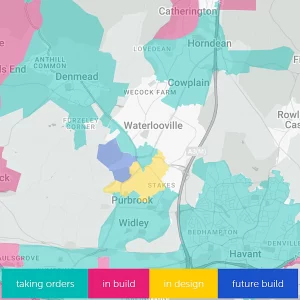Sponsored Links
Fibrestream Accuses UK Government of Distorting the Superfast Broadband Market
Posted: 06th Dec, 2010 By: MarkJ

 Fibrestream ( NextGenUs ), a community network specialist in Next Generation Access (NGA) broadband ISP solutions, has warned that the UK governments attempt to help rural areas get online with "super-fast" internet connectivity could also be directly distorting the market.
Fibrestream ( NextGenUs ), a community network specialist in Next Generation Access (NGA) broadband ISP solutions, has warned that the UK governments attempt to help rural areas get online with "super-fast" internet connectivity could also be directly distorting the market.At present the government's Broadband Delivery UK (BDUK) department has set aside £530m until 2015 (rising to £830m by 2017) to help the country become "the best broadband network in Europe". This includes deploying super-fast solutions into many remote and rural areas. It will also be used to make sure that everybody has access to a minimum broadband download speed of 2Mbps by 2015.
Fibrestream, which was recently refused an invite to the governments Fibre Tax discussion (note: delayed due to snow), admits that the drive to improve our national broadband network has helped to build momentum and grow interest, which they claim is despite Ofcom's (regulator) "mixed record of success" on protecting UK consumers from monopoly abuse. However there have been other, apparently unintended and less desirable, consequences of the government's big broadband push.
Fibrestream's Boss, Guy Jarvis, said:
"What is not so good is that there is a major state aid problem emerging concerning market distortion as an unintended consequence of the very government intervention ironically meant to stimulate and accelerate broadband delivery in the UK!
What NextGenUs is finding with disturbingly increasing frequency is a stark contrast between conversations with communities in the four BDUK market testing areas and those communities not on a promise of public subsidy.
In areas including Cumbria and North Yorkshire, a perfectly real concern for folks who desperately want decent and future-proof broadband now is that by signing up for service with NextGenUs (or anyone else for that matter) now then people will be penalised when any funding procurement process does eventually happen."
"What is not so good is that there is a major state aid problem emerging concerning market distortion as an unintended consequence of the very government intervention ironically meant to stimulate and accelerate broadband delivery in the UK!
What NextGenUs is finding with disturbingly increasing frequency is a stark contrast between conversations with communities in the four BDUK market testing areas and those communities not on a promise of public subsidy.
In areas including Cumbria and North Yorkshire, a perfectly real concern for folks who desperately want decent and future-proof broadband now is that by signing up for service with NextGenUs (or anyone else for that matter) now then people will be penalised when any funding procurement process does eventually happen."
The Secretary of State for Culture, Olympics, Media and Sport, Jeremy Hunt, disagrees and has apparently taken the not unreasonable viewpoint that "the case for market distortion [has] not yet [been] proven".
Guy Jarvis added:
"Well the evidence is surely mounting that market distortion is happening right now, as predicted and the contagion of market distortion can only spread it appears, as communities all over the country are incentivised to hesitate and wait in the hope of securing, and in fear of missing out on, a taxpayer handout."
"Well the evidence is surely mounting that market distortion is happening right now, as predicted and the contagion of market distortion can only spread it appears, as communities all over the country are incentivised to hesitate and wait in the hope of securing, and in fear of missing out on, a taxpayer handout."
Later today Jeremy Hunt is expected to outline how Broadband Delivery UK (BDUK) will achieve its many broadband commitments, which will hopefully include further information about its procurement rules. Major operators like BT are already planning to bid for a significant slice of public funds. Hopefully smaller providers also have their own projects priced and ready to submit.
Search ISP News
Search ISP Listings
Search ISP Reviews
Latest UK ISP News








Cheap BIG ISPs for 100Mbps+
150,000+ Customers | View More ISPs
Cheapest ISPs for 100Mbps+
Modest Availability | View More ISPs
Latest UK ISP News
Helpful ISP Guides and Tips
Sponsored Links
The Top 15 Category Tags
- FTTP (6800)
- BT (3881)
- Politics (3075)
- Business (2767)
- Openreach (2663)
- Building Digital UK (2512)
- Mobile Broadband (2475)
- FTTC (2142)
- Statistics (2128)
- 4G (2092)
- Virgin Media (2024)
- Ofcom Regulation (1779)
- 5G (1732)
- Fibre Optic (1604)
- Wireless Internet (1595)
Sponsored
Copyright © 1999 to Present - ISPreview.co.uk - All Rights Reserved - Terms , Privacy and Cookie Policy , Links , Website Rules






























